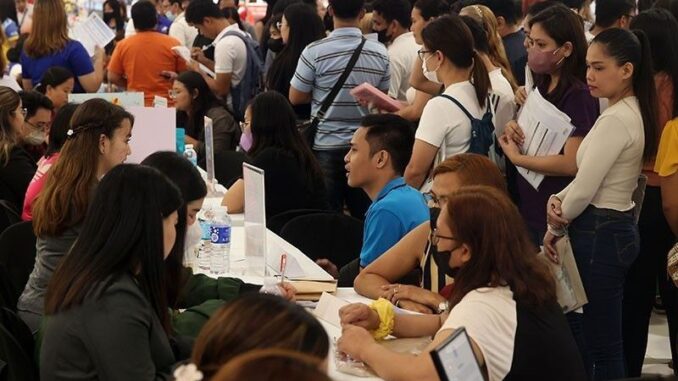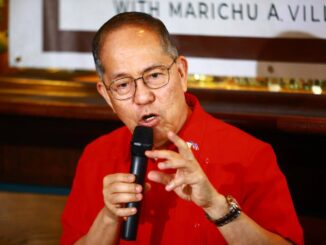
MANILA, Philippines — For most Filipinos, job creation should be included in the platforms of senatorial candidates in the May 2025 midterm elections, a commissioned Pulse Asia survey showed.
Over half or 57 percent of 2,400 respondents selected “job creation, livelihood generation and financial literacy” as issues that should be outlined in candidates’ platforms.
“Investment-led economic growth” was selected by 44 percent of respondents, followed by “fighting corruption” at 41 percent.
The Sept. 6 to 13 survey, commissioned by Stratbase ADR Institute, allowed respondents to select up to three issues.
Other issues included in the survey were quality health care (33 percent), quality education (29 percent), peace and order (24 percent), wider internet access (19 percent), building various renewable energy sources (18 percent), reliable mass transportation (17 percent) and illegal drugs (15 percent).
Reacting to the survey results, Stratbase founder Dindo Manhit noted the importance of investment-led growth for sustained economic development.
“When we prioritize investments, we not only fuel sustainable growth but also build a foundation that allows us to recover swiftly from disruptions, empowering us to face future challenges with confidence,” he said.
Candidates should prioritize fighting corruption in their platforms, he noted.
“Voters want to see a commitment to integrity and accountability from those who aim to serve and a clear stance on anti-corruption is essential for building public trust,” Manhit said.
Corrupt government officials must be held accountable, according to 91 percent of respondents.
The survey also asked respondents what they think are the benefits of controlling corruption.
Some 61 percent said it would increase trust in government, followed by 58 percent who said it would improve ordinary lives.
Other perceived benefits are economic growth (52 percent), achieving good governance (45 percent), effective delivery of public services (40 percent) and efficient utilization of government funds (35 percent).
Asked how corruption affects them, 65 percent of respondents said it resulted in loss of trust in public officials.
Other impacts include worsening poverty (51 percent), inefficient service delivery (45 percent), abuse of government officials and prevalence of bribery (43 percent), being desensitized to corrupt practices (41 percent), significant loss of funds (39 percent) and non-competitive economy (11 percent).
“The impact of corruption goes beyond individual acts; it erodes trust, deepens poverty and damages the social fabric that binds us together,” Manhit said.
Pulse Asia’s September poll had a two percent margin of error.
Self-serving
Vigilance is crucial in voting for candidates in the 2025 polls as most aspirants seem to only be interested in “pursuing shallow and self-serving political agendas,” the Alliance of Concerned Teachers (ACT) said yesterday.
It is alarming that most candidates are either traditional politicians, members of political dynasties, “fake representatives” of marginalized groups or dubious characters, said ACT chairman Vladimer Quetua.
“The perpetuation of political dynasties in our government is a glaring violation of the 1987 Constitution, Article II Section 26, which mandates equal access to opportunities for public service and prohibits political dynasties. Dynasties like the Marcoses, Dutertes and many other prominent families have continued to reinforce their grip on power to benefit their interests at the expense of genuine development and progress for the Filipino people,” he said.
The ACT accused party-list groups, such as Epanaw Sambayanan and Duterte Youth, of being led by “notorious red-taggers and fake news peddlers.”
“The Makabayan Senate slate offers a promise of progressive public service committed to addressing the root causes of poverty, inequality and corruption while upholding transparency, accountability and inclusive governance,” Quetua said.
Gringo: Unfinished business
After serving for 21 years, former senator Gregorio Honasan believes that he still has unfinished business as a legislator.
In an interview with “Storycon” on One News yesterday, Honasan said they formed a new political party – Reform Party – to offer Filipinos a broader range of choices in the 2025 polls.
Honasan, who served as senator from 1995 to 2004 and again from 2007 to 2019, is pushing for digitization of the bureaucracy.
He also stressed the importance of mobilizing Filipinos to prepare “for any eventuality,” citing the ongoing conflict in the South China Sea and other security issues.
Honasan expressed readiness to campaign with other members of the so-called macho bloc – former Senate president Vicente Sotto III, former senator Panfilo Lacson and Sen. Lito Lapid – who are also running next year.
“I have no control over their campaign. But if they will ask me to join, it’s OK,” he said.
Sotto, Lacson and Lapid are part of the Marcos administration’s Alyansa para sa Bagong Pilipinas coalition.





Be the first to comment